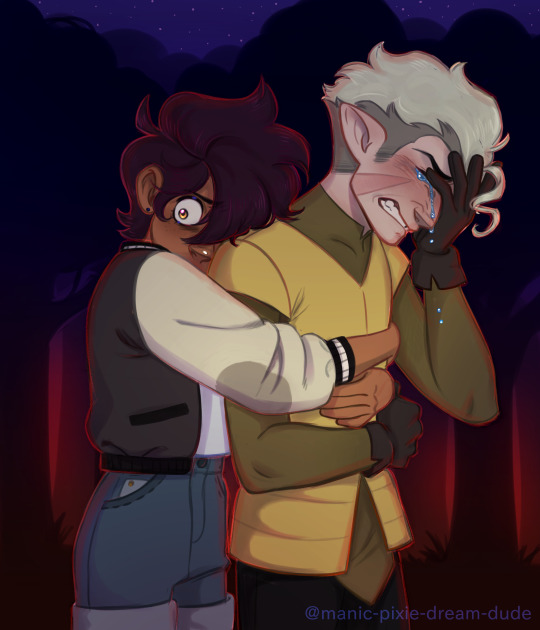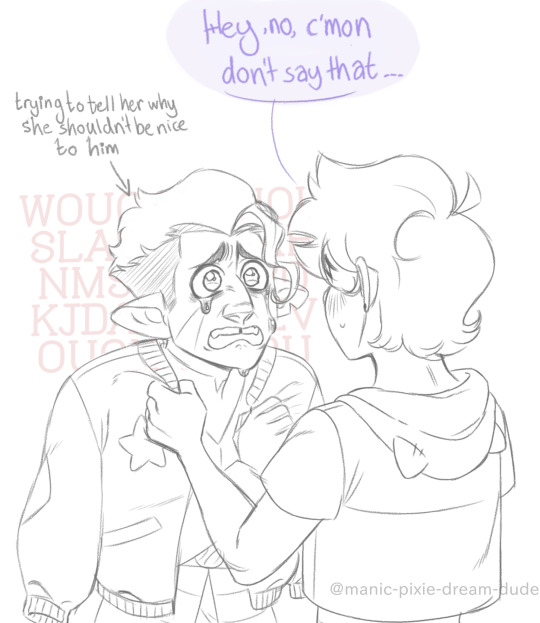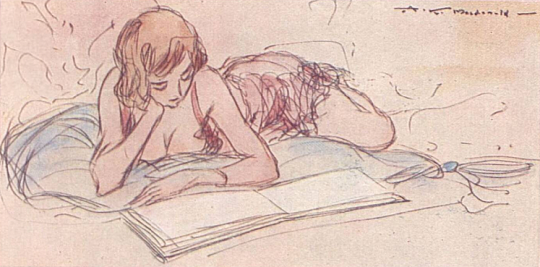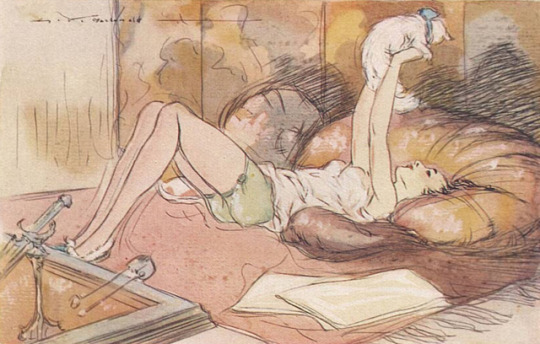They/She - Classics, JRWI, TMA and the occasional MCU rambling
Last active 60 minutes ago
Don't wanna be here? Send us removal request.
Text
A little progress update on my art noveau inspired Jay
Unrendered:

Vs rendered:

But, I don’t love the vine in the og reference and I need to think of something for her to be leaning on
#jrwi#jrwi show#jrwi riptide#jrwiblr#jrwi fanart#jrwi art#jay jrwi#jay ferin#jay ferin jrwi#jrwi jay#just roll with it jay#just roll with it#paint on the walls
26 notes
·
View notes
Text
A clip of the ending of the live-action Lilo and Stitch movie ended up on my feed, so y'all get to hear me bitch about it. Specifically, the idea of Nani giving up Lilo so she can go to a mainland college.
A. Fucking. US MAINLAND. College.
When we're out here doing SO MUCH trying to keep our Native Hawaiians home. Like, are you fucking serious? More Native Hawaiians (53%) now live outside of Hawaiʻi than within it! Only 23% of the Hawaiʻi population is listed as Native Hawaiian—and that number includes mixed-race individuals. (There’s mostly Mixed Plate Specials over here <3)
Think about that for a second. Out of well over a million people living in the islands, only around 300,000 are Native Hawaiian. That’s it.
And yeah, we can dig deeper into those statistics later, but for now, let’s just sit with how absolutely messed up it is that the underlying message of this Cash Grab L&S remake seems to be: “It’s good and right for Nani to give up her little sister to the state and go chase mainland dreams.”
Even worse? It’s Lilo who tells Nani to go. Like that’s supposed to be sweet or inspiring or something.
That is so freaking fucked up.
And it's such a gross misunderstanding of the issue WHY Nani shouldn't and WOULDN'T give her sister up.
Native Hawaiian children are more likely to be removed from their homes for neglect—not abuse.
Several studies have found:
Native Hawaiian kids were placed in care more often for neglect than non-Hawaiian kids. They are grossly overrepresented for being taken away because of neglect.
"But Angel, if these kids are being neglected, they SHOULD be taken away and put in a stable environment, right?"
Yes! If they actually ARE being neglected! And if neglect wasn't based on subjective standards that target Native families!
I went to a Hawaiian immersion school when I was in elementary school (Also because my brothers were in Special Education and this almost completely Native Hawaiian run school was the BEST for Special Education on the island) and did NOT know that Hawaiian kids were not the actual majority in Hawai‘i until I was in 7th grade and tossed in with the rest of the district in Middle school.
A good portion of those kids were in foster care.
Some were because of parental drug abuse or physical abuse, ect, (The local domestic violence shelter was up the road,) but a majority were from parents who were trying VERY hard to regain custody. Aunts and Uncles and Sisters and Brothers and Cousins and Tutus of all genders trying so hard to gain custody in a way that made it so it would be harder for them to be taken away.
Some reasons I have PERSONALLY seen given as to why Native Hawaiian children have been removed from their homes are:
"Inability to cope with parenting — (this is extremely subjective and is often a bullshit excuse to say that Native Hawaiian Caretakers aren't good enough. In the case I saw, it was because the mother was a teen mom, but she did a damn good job.)
Inadequate housing — (Which also includes having "too many people in the house”, when culturally many native Hawaiians live with extended family. Case in point was because the kids lived with their five cousins.)
Low or misused income — (Literally not having enough money when milk costs 10 dollars a gallon here…)
Broken families — (having a stepmom/stepdad, anything non-traditional.)
These aren't acts of violence against the kids. These are normal family lives. These kids would cry so hard about their home life, they wouldn’t focus on school, they’d act out, they’d hurt other kids and seek any sort of love and attention from stable adults.
Native Hawaiian kids are:
Overreported
Overseparated
Kept in the system longer
More likely to re-enter foster care
This isn't unique to Hawai‘i and I won’t pretend it is. Bias in child welfare systems has also been extensively documented in African American and Native American communities, with indigenous peoples especially being targeted, especially recently. In acts that can only be described as a continuation of the White Man’s Burden ideology and residential schools, often POC children are tossed into group homes that see them as little more than a paycheck and a chance to “save the poor little wretches from their people”.
The problem was that the system was built on its own narrow ideas of what “good behavior” looked like—usually the way white middle-class kids were expected to act.
The stories I heard and the things I saw made me understand that the system was not just flawed—it is actively hurting ‘ohana in our state. The reasons kids were taken weren’t always about danger or neglect.
It’s a quiet kind of violence, but it’s violence all the same. It fractures the very fabric of what makes a community strong—connections, histories, the ability to hold each other through hard times.
POC children do not do well in the US foster system because of the systemic racism present.
Not to mention that Lilo has behavioral issues and is obviously going through a lot after her parents' death. She's neurodivergent, a POC, and vulnerable now that her parents are gone.
Nani would be aware of these circumstances. She would never willingly give her sister to a system that is literally against her. And Tūtū can have Lilo removed from her home for anything from being “too old to be capable” to Lilo getting in trouble for violent behavior. (Which she's known for and likely will get worse now that the only person still alive from her immediate family is in FUCKING CALIFORNIA, WHICH, BTW, SENDS THEIR STUDENTS HERE TO STUDY MARINE BIO).
Yes, Nani is allowed to have a life outside of Lilo. She’s a 19-year-old who suddenly had to become a parent to her little sister after unimaginable loss. She’s doing it all alone—no real support system, no safety net, barely scraping by. She is SUFFERING.
But the beauty of the original Nani was that despite all that pain and pressure, she chose to fight tooth and nail for her sister. Because that’s her ʻohana. And as the original movie hammered home: ʻOhana means family. Family means nobody gets left behind or forgotten.
That wasn’t just a cute line or a throwaway bit. It was the theme of the story. It was a message about resilience, love, and keeping your loved ones together—especially in the face of colonialist systems that do try to tear families apart.
And Nani would know what would await Lilo if she were taken away—shuffled through the system, disconnected from her culture, her roots, her ʻāina. She’d be statistically more likely to end up homeless as soon as she turns 18. (Unfortunately this is a reality for so many foster kids I know.)
Yes, she left Lilo with David’s Tūtū. And yes, I’m sure David’s Tūtū is a lovely lady, even though she wasn’t in the original movie. But that’s full-on giving her sister up, letting go of custody and walking away for good. That’s not what the original Nani would do—and it sure as hell shouldn’t be painted as the “right” thing.
Lelau was one of those kids who was a real-life Lilo. (and Lilo was her obsession, ironically, she had so much Lilo and Stitch merch.) Lemme tell you a quick story about her.
She was my best friend for most of elementary school. She wasn’t “bad,” but she was different—emotional, lashed out and behaved in a way that was easy for adults to misread or just plain misunderstand.
Her older brother had been taken by child services too, but because he was quieter, more “compliant,” he stayed with their older sister who already had a big family. That sister was trying to keep everything together, but with her own kids to raise, the weight was heavy. Meanwhile, Lelau got bounced around between different foster homes and relatives’ places because the system said she didn’t “behave.”
I think about Lelau a lot. I wonder what she would have thought if she watched this trash as a child, and saw herself in this Lilo, and saw herself as more of a burden than she already did.
Because here’s the truth: kids like Lelau already think they’re the problem. They hear it every day, even if no one says it out loud. It’s in the sigh when they walk into a room. It’s in the way teachers pull away, or how other kids are told to “be patient” with them like they’re some sort of test. It’s in the case files that reduce them to diagnoses and risk assessments. And it’s especially in the “well-meaning” media that repaints trauma and neurodivergence as something to grow out of—or to be handled by someone else entirely.
What they don’t get to see nearly enough is the fight to keep them. The fierce, messy, uncompromising love of someone who says: You’re not too much. You’re not broken. You’re mine, and I’m not letting go.
That’s what the original Lilo & Stitch gave us. That’s what Nani was. She wasn’t perfect—she yelled, she struggled, she made mistakes. But she stayed. She kept showing up. And she refused to let the system take her sister. That’s the kind of story Lelau needed. That we all needed as a kid.
And yeah, the funny blue aliens were the real reasons we watched it as kids, but that doesn’t mean the message was lost on us.
So when I see these rewrites—this gross and horrible story where Nani gives up custody, where that decision is framed as “self-empowering” or “best for Lilo”—I feel sick. I know it’s just a story. But stories matter. Especially to kids who are already hanging on by a thread. Especially to kids like Lelau who don’t have stable adults around, who feel like a problem, who live every day waiting for someone to decide they’re too much and walk away.
Nani and other caregivers deserve better wages, free therapy, housing support, childcare, a goddamn village to help raise that child. Help shouldn’t mean losing the people they’re fighting for. Help should look like wrapping around both the kid and the caregiver. Keeping families together.
But the system doesn’t work that way—by design. It’s rooted in colonialism. It’s built to police poor families, brown families, Native families. It calls it “protection,” but it strips kids of their language, their culture, their names, and places them in homes that get paid to raise them out of context. That’s not safety. That’s assimilation.
Lelau got told again and again that her feelings were “too big,” her reactions were “bad behavior,” and that she needed to learn to “be good.” But what she really needed was someone to say, “I see you. I hear you. I get why this is hard. And I’m not going anywhere.”
She needed what Lilo got in the original story. A sister who would burn the world down if it meant keeping her safe. Her sister tried, god did that sister try, but it was so fucking hard.
I guess I just keep wondering how many kids are watching this reboot, this sanitized versions of their own pain, and slowly internalizing that they are the problem. That the most “loving” thing they can do is to “stop being the burden”.
But that’s not love. That’s the system talking. That’s white supremacy and capitalism in a child welfare costume. That’s the lie kids like Lelau are told every single day.
And I’m just so fucking tired of it.
If you’re gonna tell a story about broken families, about loss, about trauma, about Hawai‘i, then tell the truth. Don’t paint giving up custody as this amazing, empowered choice if you’re not gonna talk about how the system coerces that “choice” out of people in the first place. Don’t act like this was the best option for the child themselves.
Because I’ve seen what happens when those kids grow up. I’ve seen what happens when no one fights for them. And I’ve seen the difference it makes when someone does.
830 notes
·
View notes
Text
Being in a niche fandom (i use ‘niche’ loosely) is hell because what do you MEAN i cant just go up to some rando and be like ‘yo whats your favorite amazing devil song’ and then ramble for six hours about the entire discography of this band????
181 notes
·
View notes
Text
"But like rubbing wine stains into rugs it's my curse, to try to make it right but by trying make it worse" a beautiful lyric from "Farewell Wanderlust" by the Amazing Devil, if you have not listened to them do so now.
But besides that there is a word for the exact thing they are describing in german "verschlimmbessern". It consists of two words "verbessern", meaning to improve or to "make better" and also "verschlimmern" meaning to "worsen".
And I do love that there is this very specific word that means you are trying, you are trying to improve the situation, but by trying, by putting in effort you are making it worse. You worseimproving it, you have no evil intent, but you lack skill or knowledge so you will fail
157 notes
·
View notes
Text
riptide tomorrow #trust

491 notes
·
View notes
Text
I am spoiling the live action Lilo & Stitch. And I am doing it up front and plainly.
Do not fucking see this movie. Do not waste your money on this. Period.
They made Nani give Lilo up to the American government. They made Nani LEAVE Hawaii and pursue being a marine biologist. They made a native Hawaiian character give up her sibling to pursue a dream that she originally did not have. This is imperialist propaganda at its FINEST.
The original fucking movie is about family staying together. It's about indigenous people being able to stay with each other and stay in their home and be together! That's the whole fucking point! Nani is Lilo's last living relative on her homeland—it is jarring, it is disgusting and disturbing that Nani would not only leave her last blood relative alone, give her up to the very government that is harming native Hawaiians TODAY, but also travel to the "mainland" for her dream!
Not to mention, Nani's actress isn't fucking Hawaiian. She's much paler in photos and real life. They fucking darkened her for this movie.
Don't even get me started on the transgender subtext of Pleakley's "human" disguise from the original movie being completely erased in favor of him being played by a regular ass white man. Jumba doesn't have his accent, they made him more villainous, and his "human" disguise is a non-fat white man—which part of his original joke, I know, is that he was bigger and was more clumsy in the movie because of his size, but to have the main shape of his character completely removed is also fucking weird.
This live action movie is a desecration to the original. I encourage you to not see it, please. Don't give Disney any of your money on this one. Just watch the original. Please just watch the original.
The new message in the live action movie is disturbing and gross.
This is one of the most disrespectful live actions I've seen and heard of. I implore you to not watch it.
72K notes
·
View notes
Text
the live action lilo and stitch being firmly fixed on the stance "nani has to give up her dreams for lilo!!! that's not fair" when in the original movie her dream was her and lilo. the whole struggle of the film rests on the fact that nani actually wants lilo to stay, that she doesn't want the state to take her sister away from her. nani struggling to cope with the challenges of being a guardian at 18 was never because she was annoyed she had to give up her own free time to do so (even though that is a consequence), it was because she needed a support network and nobody wanted to give it to her. this attitude also ignores the time crunch. nani is particularly fragile because she has 3 days left to turn things around. if nani wanted to shrug and give her sister to the state then she would just... do that? there wouldn't be any story tension. there would be no movie.
and an argument can be made about rationality and realism and whatever floats your boat ig. but as a story the ending... it just gives the whole film this nasty aftertaste, deciding to function not as a heartwarming hopeful tale of found family but instead as a bitter pill that children must swallow. where it punishes a young girl for being a 'burden' on her older sister, and tells her outright that after the loss of her parents, she isn't allowed to be a child. she has to grow up.
its really kind of disgusting.
1K notes
·
View notes
Text
2002 Lilo & Stitch: Ohana means family!
2025 Lilo & Stitch: Ohana means leave an indigenous child who is neurodivergent to the state, even though historically that always led to erasure of culture and forced family separation. abuse, death or worse – 'somehow lost'! But make it girlboss so there's a noble reason behind it! While we are at it, let's have our main character walk around a resort and enjoy its services so that we can promote our Hawaiian resort even though the original theme of the movie is anti-tourism and Lilo takes pictures of the tourists as a form of retaliation for them using her, her land and her culture as a prop!
5K notes
·
View notes
Text

"I'm so, so sorry you had to find out like that..."
I really hope these kids will be okay :( for now have a bonus:

13K notes
·
View notes
Text
happy PRIDE i’m here i’m queer and i believe the land should be given back to the proper indigenous stewards.
215K notes
·
View notes
Text

WIP of an art nouveau Jay to cope with my insane workload this week
#the frame is sketched out but I might change it#it’s got the sun and some star maps bc yk she’s a navigator#I was thinking of adding some sprigs of flowers around#cypress for the grief of her sister#bilberry for her betrayal to the navy#trillium for bisexuality and I think it’s pretty#apple blossom for good fortune and better things to come#lmk if I should add anything else#jrwi#jrwi show#jrwi riptide#jrwiblr#jrwi fanart#jrwi art#jay jrwi#just roll with it jay#jay ferin jrwi#jay ferin#riptide tomorrow
58 notes
·
View notes








